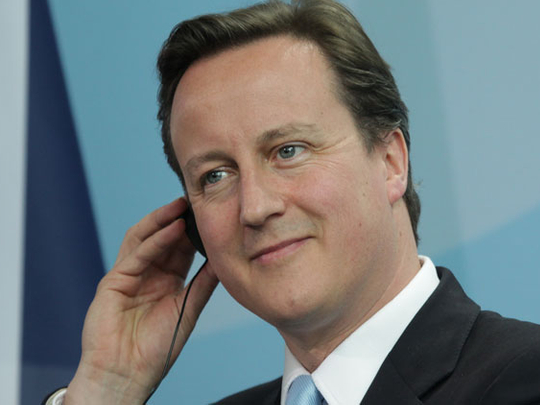
Bilateral relations between the UAE and the UK are stronger than ever.
In the last nine months alone, Queen Elizabeth and Prime Minister David Cameron have both made high profile visits to the federation. The City of London continues to view the UAE as a key partner and I hope that my visit this week, accompanied by a senior City business delegation, will help to strengthen ties further.
The UK's ongoing commitment to the UAE was recently emphasised by the creation of a joint task force with the aim of increasing the volume of bilateral trade from £7billion (Dh41.40 billion) to £12billion by 2015. Equally importantly, however, it aims to build on UK's longstanding links in areas such as culture, education and foreign policy.
Underpinning Emirati-UK ties is a sense of a shared history. More than 100,000 British Nationals live and work in the UAE, while over one million British tourists visit the UAE each year. Meanwhile, thousands of Emiratis come to the UK as tourists and students, or to do business. Many of them are property owners and investors in the UK — members of the community rather than just visitors.
From the City's perspective, this relationship is viewed very much as one of sharing skills and experience to grow both financial sectors. Closer partnership will support the wider goals of economic diversification and growth.
Infrastructure development is crucial to both countries. The scope of programmes under the broad concept of Abu Dhabi 2030 — involving regional railways, metros, water transport and better roads — is truly astonishing.
Financial model
Addressing potential bottlenecks to growth is vital to ensuring long-term prosperity — and it is exciting to think that in a few years time those proceeding sedately along the Shaikh Zayed Road between Abu Dhabi and Dubai are likely to be overtaken by a fast train, delivering its passengers into the heart of each city.
The City has considerable expertise in mobilising the capital needed for such large-scale development. In particular, public-private partnership (PPP) can provide a financing model that enables the UAE to lock in long-term expertise through involving the private sector in public service delivery.
Education, training and qualifications are also crucial when it comes to nurturing the skills base of our people. Closer collaboration between the UAE and the UK in this area will help to boost the mutually beneficial exchange of talent, ideas and capital. I look forward to discussing this issue when addressing students at the Higher College of Technology in Abu Dhabi and Cass Business School alumni in Dubai. The provision of world class education has been central to the UK's reputation for developing and attracting the talent needed by firms operating in the global financial services industry. This reality is not changed by the increasing shift of economic influence towards the East — far from it.
I am often asked whether this shift is a threat to London's position as a leading international financial centre. The answer is no — as long as the nations remain open for business and work closely with key partners across the globe. That is why I am here in the UAE.
London is a financial centre which is truly internationally owned, managed and staffed: it leads the world in cross border lending, plays host to nearly 300 foreign owned banks, and is a second home to people from all corners of the world.
London is also fortunate to have attracted significant Emirati investment into the UK. Half the top 10 sovereign wealth funds — including the Abu Dhabi Investment Authority — have offices in London. Londoners welcome their choice of London as a major centre.
This partnership has also helped secure Emirati funding for notable projects such as Europe's largest windfarm, the London Array, and the UK's most ambitious port and logistics centre, the London Gateway near the mouth of the River Thames. Significant sums have also been invested — as much as it hurts me to say it as an Arsenal fan! — into Manchester City Football Club.
London is a key centre for capital raising and its deep and internationally-focused equity markets offer scope for companies based in the UAE to list to increase their international profile and to widen their shareholder base.
This is mirrored by the large number of British financial and professional services firms operating in the UAE, contributing to the process of diversification and infrastructure development, advising on legal frameworks and, importantly, both employing Gulf nationals and giving them scope to develop their careers across their international networks. It is clear that the enduring UAE-UK partnership continues to benefit both sides, and I hope my visit will serve as a learning tool for practitioners to share experiences and strengthen financial ties.
Of course, both nations have encountered difficulties in the wake of the global financial crisis. But financial services and trade in general are not a zero sum game: our nations can all be stronger if we work together to overcome the challenges of a fast-changing world.
Michael Bear is Lord Mayor of the City of London.









